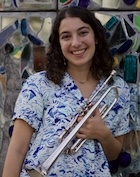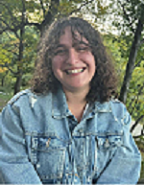Student Ambassadors
Speaking with a student ambassador is a great way to get a previous student’s perspective on the Language Schools experience.
If you would like to connect with a student ambassador to ask questions, please contact the School of Hebrew at hebrew-ls@middlebury.edu.

Sean Krulewitch
Hometown: Seattle, WA
Program: 3-week Immersion, Lifelong Learner and Traditional Track
Level: 2
Current: Security Program Manager
Why did you choose to study at our School of Hebrew?
A friend and language coach had recommended Middlebury and I was intrigued by the Language Pledge. The Hebrew program sounded like the structure and challenge I was looking for as I wanted an immersive experience that would help to push me past the plateau I had reached with self-study. I’ve always had an interest in learning Hebrew, but I really needed the right environment to make progress and accelerate my learning.
What surprised you about your experience at the School of Hebrew?
The support from the entire community of faculty, staff, and students in the program really stood out for me. It felt like everyone was invested in helping me learn. Whether it was answering questions, joining conversations at meals, or general encouragement during the various activities — the sense of shared commitment and learning from everyone was really incredible.
Please describe how your language skills improved due to your studies at Middlebury.
The program gave me a huge boost in my confidence and comprehension skills. Even now, weeks after the program, without actively studying, I’ve noticed a big jump in my listening skills and ability to follow conversations.
Describe a typical day at our School of Hebrew.
Intense, in the best way! From the first days, you’re living the language in classes, meals, and even casual conversations. A typical day for me began early, sometimes reviewing materials before walking over to the dining hall for breakfast and starting the day chatting in Hebrew with others before class. Classes would go from 8 am - noon and then lunch and more conversations in the dining hall. After lunch, back to class for focused study time and homework until 2:30 pm. After that, there is a lot of flexibility and I would often nap or take some down time to read or listen to music. Later in the afternoon there were always a number of activities to choose from, followed by dinner and often additional activities in the evenings.
What advice would you give someone wanting to attend the School of Hebrew?
If you have the opportunity, and can commit the time, just do it! I’m not sure there is a better alternative for the unique and immersive experience at Middlebury. The Language Pledge and the immersive, supportive environment is a really unique experience.
KMarie Tejeda
Hometown: Boston, MA
Program: 7-week Immersion
Level: 1,2,4
Current: Boston University, Graduate, Ph.D. Program of Religion, 2026
Why did you choose to study at the Middlebury Language Schools?
My Hebrew teacher recommended me to attend Middlebury Language Schools because although I had two years of studying Modern Hebrew in the past, I couldn’t understand and speak the language.
Describe a typical day at Middlebury.
A typical day at Middlebury would be waking up early in the morning, take a shower, go to each breakfast, go to class until noon, getting help with our homework, attend various fun extracurricular activities–or having time for yourself–having breakfast, and in the evening eating dinner, and engage either in more extracurricular activities or be in your room finishing homework if you haven’t done so. Over the weekend, there are several extracurricular fun activities, or some people might go to the nearest cities for internal tourism.
What other language learning opportunities have you had? How would you compare this experience to Middlebury?
I studied Modern Hebrew during my undergraduate and master’s studies. However, I couldn’t understand or speak the language until I came to Middlebury. Modern Hebrew is still a challenge for me, but I can communicate and engage with people who speak the language after Middlebury.

Yuval Tessman-Bar-On
Hometown: Binghamton, NY
Program: 7-week Immersion (Modern Hebrew)
Level: 4
Current: New York University, Musicology PhD Student
Why did you choose to study at our School of Hebrew?
I chose to study at the Middlebury SoH because I believe it is one of the best environments to learn Hebrew effectively. I was looking for a good Hebrew summer program so that I could improve my Hebrew skills, both for my PhD research and for more personal reasons. The immersion aspect of Middlebury’s program means that one is able to practice Hebrew constantly and thus learn much faster than one otherwise would. Also, thanks to the FLAS program and Middlebury’s FLAS-match I was able to attend at no cost, which meant that coming to Middlebury for the summer was a no-brainer.
What surprised you about your experience at the School of Hebrew?
I was surprised how much my experience at the Middlebury SoH felt like going to summer camp! There is so much learning everyday, and the teachers make every bit of it interesting and joyous. Outside of class, there are so many activities that I wouldn’t typically have time to indulge in in regular life—yoga, art, hiking, biking, blueberry picking and more. And because they’re all in Hebrew, they’re all helping you learn and practice at the same time.
Please describe how your language skills improved due to your studies at Middlebury.
I grew up speaking Hebrew at home with my Ima (the Hebrew word for mother), but never reached more than a childhood level of communication. And, I lost a lot of my Hebrew skills as I got older and wasn’t speaking Hebrew everyday. After attending Middlebury, I was not only communicating confidently in Hebrew (about academic subjects in addition to everyday ones) but I was also thinking and dreaming in Hebrew! I also went up a level on the ACTFL language examination.
What is one of your favorite memories from your summer at the School of Hebrew?
One of my favorite memories from summer 2025 at the SoH was a day we spent hiking and swimming at Lake Dunmore, chatting in Hebrew on our way up and down the mountain, and relaxing in the sun.
Describe your typical day at the School of Hebrew.
On a typical day at the Middlebury SoH, I wake up and grab breakfast at the dining hall with a group of friends. After breakfast, it was time for our first few classes of the day, followed by a lunch break. After lunch, we had a set time to work on our homework with our teacher present to answer any questions. Then came afternoon activities; on most days, I would attend a couple of any variety of activities being offered, which included lectures on particular subjects, singalongs, discussion groups, yoga classes, Hebrew tv shows and movies, art activities and more. These activities were offered both before and after dinner. In the later evening, I would generally join friends to do homework or chat and relax together.
What advice would you give other level 4 students beginning their summer at the Language Schools?
Speak with everyone, and go to as many activities as you can!
What advice would you give someone wanting to attend the School of Hebrew?
If it’s possible for you to attend the Middlebury SoH for a summer, I can’t recommend enough that you take the opportunity. Being immersed in Hebrew for a full summer didn’t just help me improve in the language, but was also a chance to feel culturally at-home in a way that I don’t get to quite as often in my everyday life. It’s truly a special place.
What are you up to now?
I’m a PhD student at New York University, researching and writing about music of the Israeli-Arab conflict. My current work looks at music written in Hebrew and in Arabic in the period around 1948 that engages with the entangled experiences of displacement during the Holocaust and the Nakba.

Naomi Zipursky
Hometown: Omaha, NE
Program: 7-week Immersion
Level: 1,4
Current: Hebrew College Rabbinical School, Graduate, Pursuing Rabbinic Ordination, 2028
Why did you choose to study at the Middlebury Language Schools?
When I learned I needed to boost my Hebrew skills in order to begin my studies at rabbinical school, every person I spoke with told me doing so at the School of Hebrew was my only option. And they were right!
What surprised you about your experience at the Middlebury Language Schools?
What surprised me most about my experience here was how much laughter and joy can come from being in an incredibly challenging environment. When I couldn’t determine how to say I wanted to say or when my teachers would correct every other word out of my mouth, it would be easy to be discouraged. And yet inevitably, these moments would be met with laughter, smiles from everyone involved, and immense compassion and understanding. The Language Pledge is hard and yet when we’re all in it together, we get to share the immense joy of learning together, while not being alone in the hard parts.
Describe how your language skills improved at Middlebury.
Going into my first summer at Middlebury, I felt as though I was a complete beginner. While I knew the Hebrew alphabet and a few basic phrases like, “I need help” and “I don’t understand.” At the end of the summer, not only was I able to participate fully in conversations, speaking and understanding what was going on, but also I began to understand jokes, could tell longer stories in Hebrew, and could read fluently. The reading, writing, and grammar comprehension was essential for my studies in rabbinical school.
Advice to future students.
Attending a Middlebury Language Schools might be one of the hardest things you will choose to do for yourself. And yet, if you have the opportunity, attending a Middlebury Language Schools will be one of the greatest gifts you will give yourself. Taking the Language Pledge and learning at Middlebury is hard, and it’s also beautiful, empowering, fun, meaningful, and truly the best way to spend a summer.
